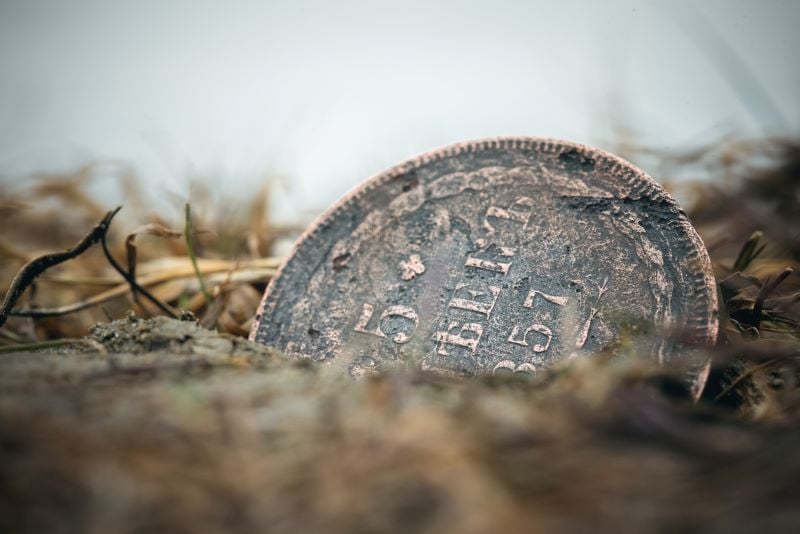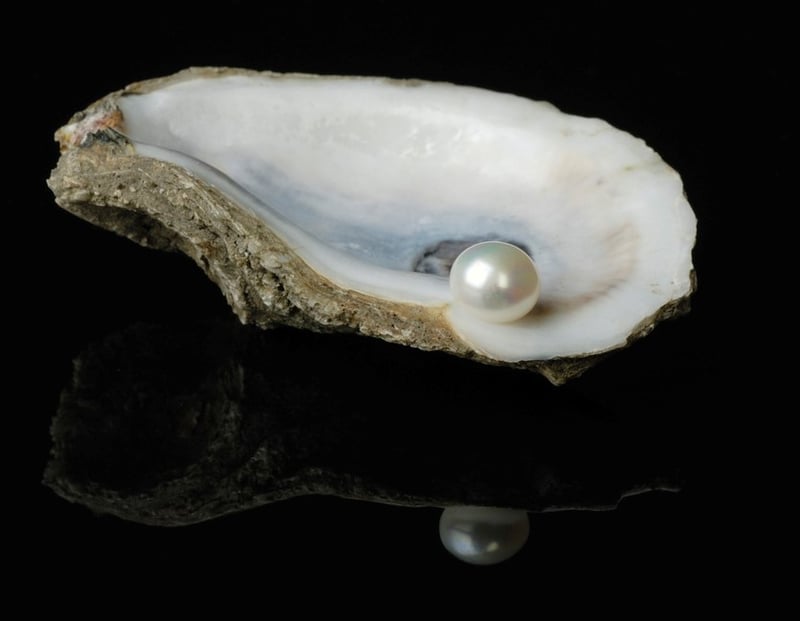Money can’t buy happiness, but we’d all like to find hidden treasure! Yet what do you value most? Jesus said where your treasure is, there your heart will be.

In the Sermon on the Mount, Jesus said, “For where your treasure is, there your heart will be also” (Matthew 6:21). To understand how this applies in our lives, it can be helpful to think about the whole concept of treasure—what we value most in life.
It’s fascinating to read about treasures, lost and found. Consider these stories:
Hidden treasure story
In November of 1992, a farmer near Suffolk, England, lost a hammer. He felt he had lost it somewhere in the fields of his farm; so after an unsuccessful search, he asked a friend who owned a metal detector for some help.
The search with the metal detector uncovered some silver tableware—and some ancient coins. So they notified the authorities, and an archaeological team came in to excavate the site.
When the excavation was complete, nearly 15,000 Roman coins from the fourth and fifth centuries had been recovered, along with silver tableware.

The assessed value in 1993 was about 1.75 million pounds (approximately $3.5 million)! The value in today’s currency would be considerably more.
Treasure lost
The story of Jesse Lauriston Livermore has a far different outcome. Jesse Livermore was a financial trader and investor during the early 20th century. He made most of his money by using a trading technique called “short selling.” Essentially, when a trader expects the market to go down, he can borrow shares and sell them while the price is high. He hopes that by the time he has to return the shares he will be able to purchase them at a lower price so he can make a profit.
Livermore made about $3 million using this method during a market panic in 1907. This fortune, however, pales when compared to the fortune he made during the great market crash of 1929.
In the months leading up to the crash of October 1929, Livermore noticed market conditions he felt were similar to those in 1907. He began short selling stocks and continued to build on those market positions. After the market crash was complete, Livermore was worth around $100 million. After accounting for inflation, that fortune would be worth much more than $1 billion in today’s dollars!
But by 1934, Jesse Livermore was bankrupt. We don’t know exactly how the fortune was lost, but we do know he continued to trade the market after 1929, and he suffered the second of two divorces in 1932.
Livermore slipped into a clinical depression from which he never recovered during the late 1930s. On Nov. 28, 1940, at the age of 63, he committed suicide in a hotel room in New York City.
What do you value most in life?
Though stories of treasures found and fortunes lost aren’t that uncommon, most of us experience neither of those extremes during the course of our lives. But we all face decisions about what we will value in life. Perhaps we are also sitting on a hidden treasure—or in danger of losing one.
Though most of us would be happy to receive more money, there is truth to the saying money can’t buy happiness.
Robert Kenny, a developmental psychologist and senior advisor at the Center on Wealth and Philanthropy at Boston College, was a leader of a research project on the aspirations, dilemmas and personal philosophies of people worth $25 million or more.
It found that “wealthy people have their own set of concerns: anxiety about their children, uncertainty over their relationships and fears of isolation.” Dr. Kenney noted, “You can’t buy your way out of the human condition.”
He said, “This research shows the rest of the world, who often think that if they just made one more bonus or sold one more item or got one more promotion, then their world and their family’s world would be so much better, that this isn’t necessarily true. There’s another whole level of concerns that parents are going to have about their kids. One of those concerns is this feeling of isolation. That’s actually a No. 1 concern for families with a high net worth—this sense of isolation—and the higher the wealth, the worse it gets. We know this is a very powerful feeling when it comes to one’s overall sense of well-being, and these people feel very isolated because they have what most of the world thinks they want. But just because you have money doesn’t mean you're not going to have a bad day every once in a while. But what you often lose when you have all this money is the friendships that support you through the difficult times.”
And as J. Paul Getty, once the world’s richest man, is quoted as saying, “I would gladly give all my millions for just one lasting marital success.”
Neither money nor poverty automatically bring happiness. That is not to say that money can’t be enjoyed. Used rightly, wealth can bring many advantages and can be shared for the benefit of many.
If something isn’t lasting, how valuable is it? Even if we manage to achieve or inherit a fortune in this lifetime, we can’t “take it with us,” as the saying goes.
But when determining what is truly valuable in life, we also need to consider the relationship between time and value. If something isn’t lasting, how valuable is it? Even if we manage to achieve or inherit a fortune in this lifetime, we can’t “take it with us,” as the saying goes. Any fortune, no matter how large, becomes worthless to its owner on the day of his or her death.
Treasures on earth
Jesus Christ had some advice for those in His day about what makes something truly valuable: “Do not lay up for yourselves treasures on earth, where moth and rust destroy and where thieves break in and steal; but lay up for yourselves treasures in heaven, where neither moth nor rust destroys and where thieves do not break in and steal. For where your treasure is, there your heart will be also” (Matthew 6:19-21).
Jesus was describing the ways riches were acquired and measured in His day, as well as the ways those riches could commonly be lost.
Garments could be very valuable in those times, especially if they were acquired by trading and brought by ships from foreign lands. Garments, though, could be destroyed by moths.
Valuables might also be represented by coins or precious metals. Those same coins and metals were subject to becoming corroded or defaced. It was common for treasure to be buried in fields or hidden in houses. In both cases, thieves could discover and carry away the treasure.
Today, we have many other ways to acquire and measure wealth, along with several new ways to lose that wealth. But the basic principles remain the same.
Treasures in heaven
What did Jesus Christ mean when He said “lay up for yourselves treasures in heaven”?
He had demonstrated that the treasures on earth are temporary and physical. They can fill immediate needs and be enjoyed in this life, but their shelf life is limited. They don’t have lasting value.
By contrast, the treasures in heaven are eternal and spiritual. They will give pleasures and joy forever.
King David wrote in a messianic psalm about resting in hope till the time when God “will show me the path of life; in Your presence is fullness of joy; at Your right hand are pleasures forevermore” (Psalm 16:11).
Though these eternal treasures and our inheritance is now stored in heaven, Jesus Christ will bring them with Him when He returns to resurrect the saints and rule with them on earth (Matthew 16:27; Colossians 3:4, 23-24; 2 Timothy 2:11-12; Revelation 5:10; 20:6; 22:12).
Learn more about this in the articles on the Life, Hope & Truth website titled “What Is Heaven?” and “Do We Go to Heaven When We Die?”
The book of Hebrews gives similar advice about the enduring nature of true treasure. The author sought to encourage these early New Testament Christians who had sacrificed to serve others and had experienced many trials.
He wrote: “But recall the former days in which, after you were illuminated, you endured a great struggle with sufferings: partly while you were made a spectacle both by reproaches and tribulations, and partly while you became companions of those who were so treated; for you had compassion on me in my chains, and joyfully accepted the plundering of your goods, knowing that you have a better and an enduring possession for yourselves in heaven” (Hebrews 10:32-34).
Both of these biblical passages tell us that something truly valuable lasts beyond the human lifetime. Both statements tell us that true treasure merits more of our time and effort than temporary riches.
What is a real treasure worth?
Jesus had further words of wisdom concerning what true treasure—treasure that lasts beyond a lifetime—is worth.
He discussed this in two of the parables of the Kingdom, the parable of the hidden treasure and the parable of the pearl of great price.
Parable of the hidden treasure
Notice Matthew 13:44: “Again, the kingdom of heaven is like treasure hidden in a field, which a man found and hid; and for joy over it he goes and sells all that he has and buys that field.”
The image again is of the practice of that time: burying treasure in a field. The treasure that is described here, though, is worth everything a person owns.

Parable of the pearl of great price
The parable that immediately follows contains the same message: “Again, the kingdom of heaven is like a merchant seeking beautiful pearls, who, when he had found one pearl of great price, went and sold all that he had and bought it” (Matthew 13:45-46).
The “kingdom of heaven” is described as the real treasure—a treasure worth more than we can possess in this lifetime. The analogy in the parables is one of trading personal valuables for lasting treasure.
The lesson is that seeking the Kingdom of God should be the No. 1 priority in our lives (Matthew 6:33).
Where your treasure is
All earthly treasure is fleeting in nature. If for no other reason, the limitations of the human life span make it so. The ancient pharaohs of Egypt had their extensive wealth buried with them, but those treasures were either robbed or sent to museums.
Man doesn’t have a way to indefinitely extend the human lifetime, and what will happen to our wealth after death remains the same. All earthly possessions will cease to be ours when we die.
At the end of His lesson on earthly treasure, Jesus tells us how to live our lives with this in mind: “For where your treasure is, there your heart will be also” (Matthew 6:21). Again, in the context of an analogy about treasure and wealth, He tells us to order our lives according to what our priorities should be.
Jesus Christ’s words deserve some careful introspection on our part.
Where is your treasure? Where is your heart?
Our booklet The Mystery of the Kingdom can help you find, value and receive the eternal treasure.





